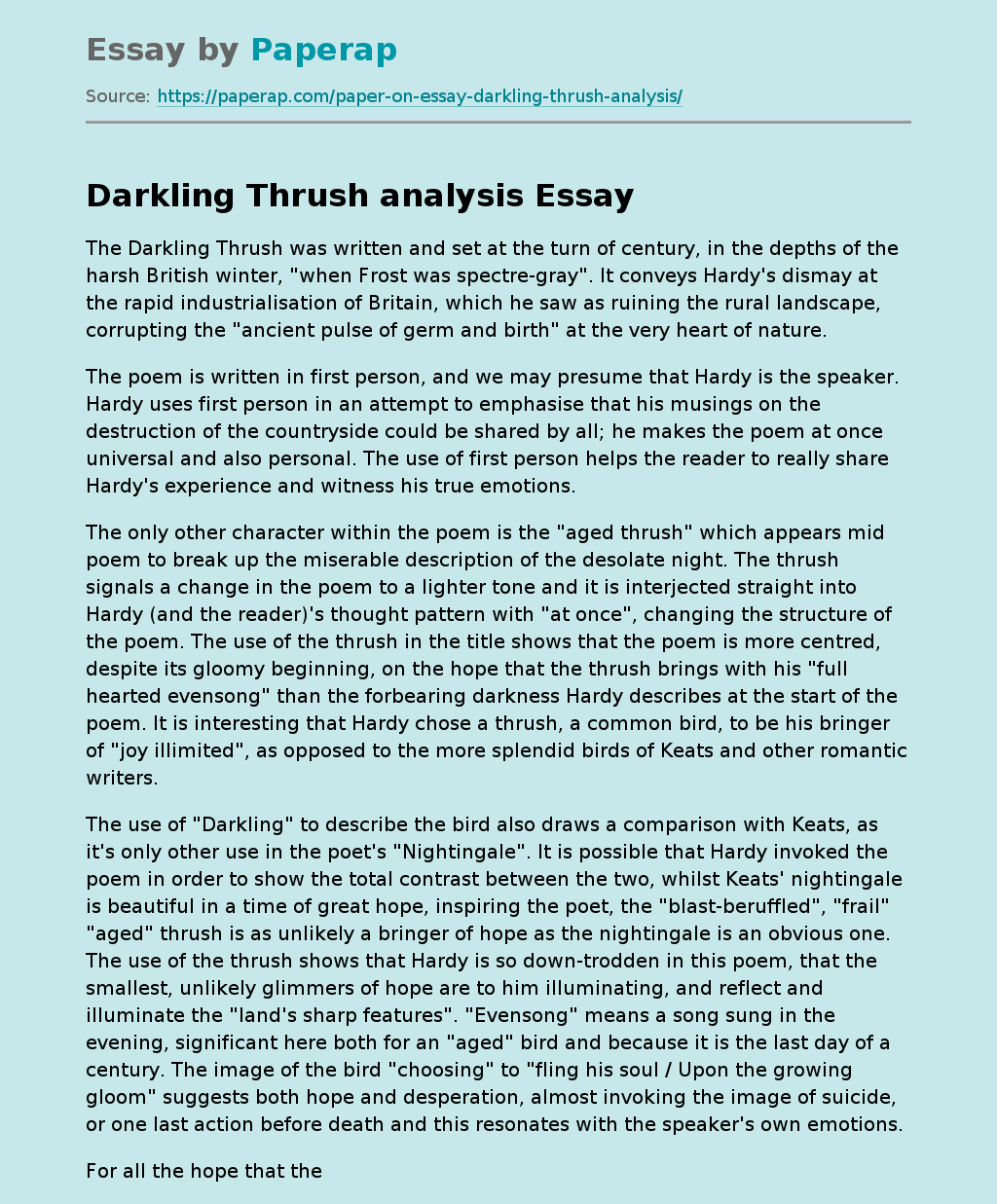Darkling Thrush Analysis
The Darkling Thrush was written and set at the turn of century, in the depths of the harsh British winter, “when Frost was spectre-gray”. It conveys Hardy’s dismay at the rapid industrialisation of Britain, which he saw as ruining the rural landscape, corrupting the “ancient pulse of germ and birth” at the very heart of nature.
The poem is written in first person, and we may presume that Hardy is the speaker. Hardy uses first person in an attempt to emphasise that his musings on the destruction of the countryside could be shared by all; he makes the poem at once universal and also personal.
The use of first person helps the reader to really share Hardy’s experience and witness his true emotions.
The only other character within the poem is the “aged thrush” which appears mid poem to break up the miserable description of the desolate night. The thrush signals a change in the poem to a lighter tone and it is interjected straight into Hardy (and the reader)’s thought pattern with “at once”, changing the structure of the poem.
The use of the thrush in the title shows that the poem is more centred, despite its gloomy beginning, on the hope that the thrush brings with his “full hearted evensong” than the forbearing darkness Hardy describes at the start of the poem. It is interesting that Hardy chose a thrush, a common bird, to be his bringer of “joy illimited”, as opposed to the more splendid birds of Keats and other romantic writers.
The use of “Darkling” to describe the bird also draws a comparison with Keats, as it’s only other use in the poet’s “Nightingale”. It is possible that Hardy invoked the poem in order to show the total contrast between the two, whilst Keats’ nightingale is beautiful in a time of great hope, inspiring the poet, the “blast-beruffled”, “frail” “aged” thrush is as unlikely a bringer of hope as the nightingale is an obvious one. The use of the thrush shows that Hardy is so down-trodden in this poem, that the smallest, unlikely glimmers of hope are to him illuminating, and reflect and illuminate the “land’s sharp features”. “Evensong” means a song sung in the evening, significant here both for an “aged” bird and because it is the last day of a century. The image of the bird “choosing” to “fling his soul / Upon the growing gloom” suggests both hope and desperation, almost invoking the image of suicide, or one last action before death and this resonates with the speaker’s own emotions.
For all the hope that the little bird brings, there is no doubt that the majority of the poem is about darkness and despair, conveying Hardy’s views on the new century and the industrialisation it will bring with it. The “coppice gate” suggests an enclosed wood, suggesting a last sanctuary from the industrialisation happening elsewhere, although even within this little patch of hope, the scene is desolate. Frost is personified, showing winter’s provenance in Hardy’s life and the “dregs” of winter give the poem a feel of finality and create the image of a last hope, and the very end of nature after everything else has been squeezed out. The obvious inference here is that Hardy feels that the growing factories and industrialisation are stifling nature. Even the sky, is cut into, “scored”, the “broken” lires and “tangled” bine stems give a sense that nature itself has been corrupted. This idea is carried throughout the poem, “the ancient pulse of germ and birth was shrunken hard and dry”.
Hardy also seems to be prematurely reminiscing for the 1800s, he wrote the poem at the turn of the century and pictures the century itself, dead and “outleant” in his “cloudy canopy”. This morbid imagery shows that Hardy longs for the past already and perhaps thinks the new century will bring only more misery. Mankind is also pictured as weak and cowardly for having “sought their household fires” and escaped the destruction they caused; they are also all seemed to be as “favourless as I”, as Hardy bids everyone to join in his mourning.
When the thrush, a figure of almost godlike over proportion, “fling[s] his soul/ upon the glowing gloom”, Hardy cannot understand what happiness could propel him to do so. He literally cannot think of anything on Earth, “so little cause for ecstatic sound…was written on terrestrial things”. Concluding by suggesting he must be sent by god, as suggested by the capitalisation of Hope and the idea that the thrush is singing a “carol” and is singing because of extra terrestrial things; hardy shows his utter lack of faith in the human world, there is literally nothing here to bring him hope, leaving us with a parting image of his despairing mental state.
Darkling Thrush Analysis. (2019, Jun 20). Retrieved from https://paperap.com/paper-on-essay-darkling-thrush-analysis/

